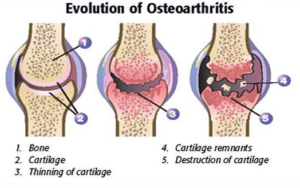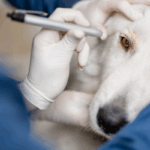What is Arthritis?
Arthritis is a progressive deterioration of joint cartilage.
Degenerative Joint Disease (DJD) is a more appropriate term used to describe this condition in veterinary medicine.
What causes Arthritis (DJD)?
DJD usually results from wear and tear on joints. With time, joint cartilage wears away and becomes roughened. This results in stiffened, painful joints.
 Conditions that lead to DJD
Conditions that lead to DJD
– Long Term High Impact Activity
– Obesity
– Medially Luxating Patella (Dislocating Knee Cap)
– Cruciate Ligament Strain (or rupture)
– Trauma to a bone or joint
– Hip Dysplasia
– Elbow Dysplasia
– Osteochondrosis or OCD
What are the main signs of arthritis?
Early signs of arthritis can be subtle, but as joint damage worsens, we may see :
– Reluctance to walk, climb stairs, jump or play
– Slowing down on walks, or even stopping and turning toward home before finishing
– Difficulty rising from a sitting or lying down position or reluctance to sit from standing
– Limping, or a stiff or proppy gait
– A personality change
How is arthritis diagnosed?
One of our vets will discuss your pets main symptoms with you, then examine him/her and look for evidence o: Stiffness of gait, lameness, reduced range of joint motion, crepitus (a grinding feeling on joint palpation), joint thickening and pain.
There are other types of arthritis (such as immune-mediated arthritis, infectious arthritis, bone cysts and even bone or joint cancer). In these rare forms of arthritis, the vet may need to test joint fluid or do blood tests to help diagnose these types of arthritis.
X-rays alone usually allow accurate identification and classification of the arthritic condition, so that treatment can be tailored to your pets type and degree of arthritis.
What are the treatment options for the management of arthritis?
– Weight reduction will greatly reduce the stress placed on affected joints. Please ask our receptionist how we can help you ensure your pet is maintained at a more comfortable, healthier body weight. We can implement a weight control program that will result in significant lessening of the signs of arthritis. For patients who do not need to lose weight, excellent prescription joint diets are also available. Initially we recommend you try Royal Canin Mobility diet. Feel free to ask our staff for more information on these diets.
 Activity.
Activity.
– Exercise should be limited to a level that minimises aggravation of clinical signs. Take not especially of how stiff your dog is after getting up from the first rest period after a walk. If a walk makes things worse, then he / she is doing too much!
Medications
– There are a range of supplements, injections and medications your pets can start once diagnosed.
Surgical Options
-Some conditions which cause DJD (Elbow displaysia, hip displaysia, Cruciate disease) require surgery and in most cases the longer they are put off, the more damage will be done, and the more likely chronic arthritis will set in.
Early diagnosis and assessment of Hip problems and Patella problems is also important as some young dogs need corrective surgery prior to the onset of arthritis. When arthritis (DJD) is advanced, and your pet is suffering with the pain despite the use of medical treatments, surgery can sometimes be an option. Your vet will discuss any surgical procedures that are relevant to your pet. Recently artificial hips and elbows have become available at specialist referral centers for treatment of severely arthritic hip and elbow joints.
Remember…
Arthritis is a very common condition, with many contributing factors. Like humans, animals can learn to live with arthritis. In people, arthritic conditions need to be accurately diagnosed in order to ensure that the correct treatment is offered. The same can be said about animals.
Call us today on 9878 3033 for more information, or to book your pet in for an arthritis assessment.






